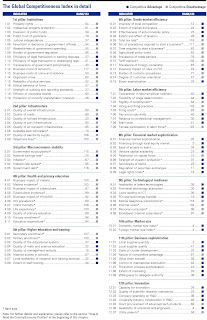The Report defines competitivenss as the "set of institutions, policies, and factors that determine the level of productivity of a country". It uses a weighted average of 12 parameters to arrive at a Global Competitiveness Index (GCI) to arrive at a comprehensive picture of the competitiveness landscape in countries around the world at all stages of development. The 12 pillars of the GCI are institutions, infrastructure, macroeconomic stability, health and primary education, higher education and training, goods market efficiency, labor market efficiency, financial market sophistication, technological readiness, marekt size, business sophistication and innovation.

About India, which improved its position, the Report points attention to its dichotomous, two-track development trend, "India’s competitive performance continues to exhibit a rather reversed development pattern. It ranks an outstanding 28th in the most complex areas measured by the business sophistication and innovation subindex, ahead of several advanced economies. The country also boasts fairly well functioning institutions (54th), bustling financial markets (16th), and a sound banking sector (25th) supported by a vast domestic market (4th largest in PPP terms). On the other hand, the country underperforms on some of the basic determinants of competitiveness, namely health and primary education (101st), macroeconomic stability (96th)—though improving—and infrastructure (76th). In addition, penetration rates for mobile telephony (116th), the Internet (104th), and personal computers (96th) remain among the lowest in the world, while inefficiencies in the labor market (83rd) prevent an optimal allocation of human capital. Improvements in these areas would place India on a stronger growth trajectory going into the future."

No comments:
Post a Comment